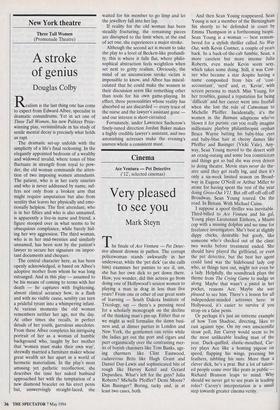New York theatre
Three Tall Women (Promenade Theatre)
A stroke of genius
Douglas Colby
R ealism is the last thing one has come to expect from Edward Albee, specialist in dramatic conundrums. Yet in act one of Three Tall Women, his new Pulitzer Prize- winning play, verisimilitude in his study of senile mental decay is precisely what holds us rapt.
The dramatic set-up unfolds with the simplicity of a life's final reckoning. In the elegantly appointed bedroom of a wealthy and widowed invalid, where tones of blue fluctuate in strength from royal to pow- der, the old woman commands the atten- tion of two imposing women attendants. The patient, who is in her early nineties and who is never addressed by name, suf- fers not only from a broken arm that might require amputation but also from senility that leaves her physically and emo- tionally helpless. The first attendant, who is in her fifties and who is also unnamed, is apparently a live-in nurse and friend, a figure stooped over in what seems to be obsequious compliance, while barely hid- ing her wry aggression. The third woman, who is in her mid-twenties and similarly unnamed, has been sent by the patient's lawyer to secure her signature on impor- tant documents and cheques.
The central character here, as has been openly acknowledged, is based on Albee's adoptive mother from whom he was long estranged. And in this play — assumed to be his means of coming to terms with her death — he captures with frightening, almost clinical accuracy how, in a flash and with no visible cause, senility can turn a prideful tyrant into a whimpering infant. At various moments the old woman remembers neither her age, nor the day. At other times she recalls, in perfect details of her youth, garrulous anecdotes. From these Albee completes his intriguing portrait of her as a woman of humble background who, taught by her mother that `women must make their own way', shrewdly married a furniture maker whose great wealth set her apart in a world of hermetic materialism. In the play's most amusing yet pathetic recollection, she describes the time her naked husband approached her with the temptation of a new diamond bracelet on his erect penis but, unswervingly straight-laced, she waited for his member to go limp and let the jewellery fall into her lap.
If reality for the old woman has been steadily fracturing, the remaining pieces are disrupted to the limit when, at the end of act one, she experiences a major stroke.
Although the second act is meant to take the play to a level of Beckett-like profundi- ty, this is where it falls flat, where philo- sophical abstraction feels weightless when set next to gritty realism. Obviously, the mind of an unconscious stroke victim is impossible to know, and Albee has miscal- culated that he could make the women in their discussion seem like something other than tools for his own game-playing. In effect, three personalities whose reality has absorbed us are discarded — every trace of the nurse and the lawyer's assistant gone and our interest is short-circuited.
Fortunately, under Lawrence Sacherow's finely-tuned direction Jordan Baker makes a highly credible lawyer's assistant, and two astonishing actresses make the evening's uneven whole a consistent must.


















































 Previous page
Previous page